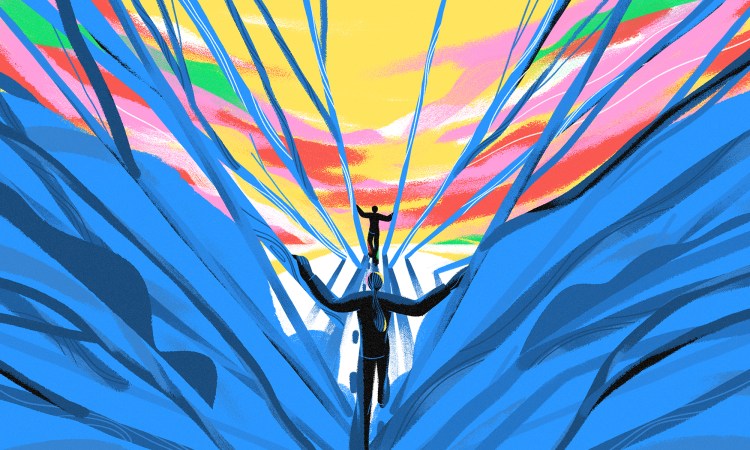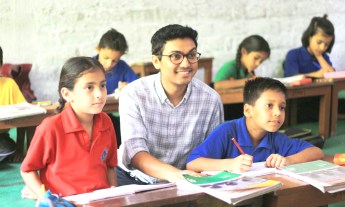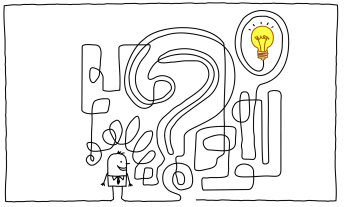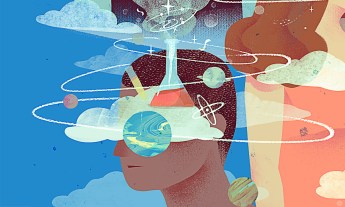
About 20 miles east of the Blue Ridge Mountains and home to the University of Virginia, Charlottesville was a town divided in the early 1980s.
The locals, many of whom lived in an economically depressed area, saw us students as rich and privileged. Some of them worked at UVA, where they seemed either invisible to students or served as objects of ridicule. In the fall of my second year at UVA, a fraternity threw a party asking everyone to dress like a local. The very idea hurt me to think about, and I didn’t attend. But I also didn’t protest.
Then, around Thanksgiving, I chanced upon a flyer inviting students to donate Christmas dinner and toys to a family in need. At least this was an opportunity to do something positive. My roommate and I decided to host a holiday party and asked everyone to bring food and a toy. As drinks flowed, a large pile of playthings and foodstuffs burgeoned beneath our scraggly Christmas tree.
The next day, we packed my roommate’s red car with a veritable Christmas feast, complete with a turkey and all the trimmings, and a big Santa bag full of toys for our “family.” We took off, a bit worse for wear but filled with Christmas spirit and a drive to be of service.
In less than an hour, we arrived in another world: dirt roads and trailer parks, a couple of gas stations, a convenience store with a barely visible street sign. We pulled into a gas station to ask for directions. I had trouble understanding the attendant and was mortified to ask him to repeat himself, though I wondered whether he had trouble understanding me as well.
Without a map, my roommate and I lost our bearings a second time. We pulled to the side of the road, stopping a man clad in overalls. To our request, he responded, “Go down that road till the end.”
Another few errant turns, and we finally found a big white sign with “Earl’s” written in red. Right behind it was a wood shack, with small windows and a porch out front.
I stared at the house and suddenly, desperately, hoped no one was home. Only then did I imagine how our presence might make the family feel. Here we were, two hungover coeds with no connection to this community, arriving with Christmas in a bag — or at least our version of Christmas. Presumably, someone had signed up for this “service,” but we knew little about the people we were visiting. A wave of shame engulfed me. “I don’t want to meet them,” I said. My roommate looked at me, thought for a moment, and agreed.
With the car still running, I opened the door, ran as quickly as my legs would carry me, deposited the bags on the porch, and hightailed it back to the car. We sped off, driving in silence until we found a diner where we could talk about what had just happened.
Our conversation ranged from somber recognition to embarrassed laughter at our own ignorance. We were glad to bring food and toys to a family that might have gone without, but this kind of drive-by charity felt wrong somehow, for everyone.
Years later, I’ve thought about what I might say to my younger self about that long-ago day. I would commend the instinct to make a contribution, but well-meaning acts of kindness are not enough. I would push my younger self to move from the blanket statement “I want to help disadvantaged people” to visualizing herself in the shoes of those she wanted to serve.
This is where moral imagination begins. But it doesn’t stop there.
Moral imagination means to view other people’s problems as if they were your own, and to begin to discern how to tackle those problems. And then to act accordingly. It summons us to understand and transcend the realities of current circumstances and to envision a better future for ourselves and others.
Moral imagination starts with empathy, but it does not content itself simply to feel another’s pain. Empathy without action risks reinforcing the status quo. Moral imagination is muscular, built from the bottom up and grounded through immersion in the lives of others. It involves connecting on a human level, analyzing the systemic issues at play, and only then envisioning how to go beyond applying a Band-Aid to making a long-term difference.
Moral imagination is the basis of an ethical framework for a world that recognizes our common humanity and insists on opportunity, choice and dignity for all of us. Had I approached the food and toy drive with moral imagination, I might have started by learning about the community and the realities those who lived there faced.
If I couldn’t spend time with the families we wanted to serve, I could have asked for information beyond the children’s genders and ages, which was the only data provided. I might have tried to connect with the family beforehand, or I could have asked to meet just the parents, so as not to risk spoiling the children’s dreams of a magical Santa-delivered Christmas.
Listening to voices unheard is fundamental to the moral imagination. So is gathering knowledge about those we intend to serve. If my roommate and I were unwilling to gain such knowledge, I could have found an organization with a commitment to the community and supported it so that it could do a better job than we could do ourselves.
The world has changed dramatically in the 30 years since that winter day in the Blue Ridge Mountains. For the privileged, today everything seems possible: Sending spaceships and inhabiting Mars, enhancing human capabilities by merging with robots, living forever. But this world of infinite possibility and space travel can seem impossibly distant to those who feel irrelevant, vulnerable or just plain poor. And if the demise of easily automated, repetitive work brings dreams of creative endeavors for the highly educated, the end of stable employment may feel precarious for those without university degrees.
Whether you are working in high tech or in low-income communities, moral imagination is what’s needed to ensure that our future solutions and institutions are inclusive and sustainable. That takes a particular kind of capability, one driven by empathy, immersion, connection and the willingness to challenge the status quo.
One of the great privileges of my life is to work with remarkable individuals whose leadership is grounded in moral imagination. The result is creative solutions that acknowledge the vulnerable and respect our natural resources.
In 2009, Carlos Ignacio Velasco, a young Colombian working as a representative of his country’s coffee industry in Tokyo, met Mayumi Ogata. She had just completed a four-year pursuit to identify the world’s finest varieties of cacao. After working in a premium chocolate company, Mayumi had wearied of the toll the industry took on farmers and the earth. More than 90 percent of the world’s chocolate is produced by about five million smallholder families, 90 percent of whom earn less than two dollars per day. And 70 percent of cacao is cultivated in West Africa, often through unsustainable farming methods.
Faced with these alarming statistics, Mayumi sought areas where high-quality varieties of the cacao fruit could be cultivated more profitably for the farmers — without harming the planet.
Of the places she’d visited, Colombia captured Mayumi’s heart. There, she found diverse, delicate varieties of cacao in a number of regions. But these same regions had suffered a half century of civil war and bore wounds from the violence of drug lords, FARC guerrillas and paramilitaries. They also are geographically isolated from the main cities, and people’s education and skills levels are quite low. Despite the risks, Mayumi assessed that prospects for cacao production were phenomenal.
Carlos had already been thinking about what more he could do to contribute to his country when he met Mayumi in Tokyo. He felt the post-conflict areas of his country needed deliberate investment if peace were to flourish. What better way to contribute than to build a company that would produce some of the world’s finest cacao together with local communities? Here, Carlos believed, was a chance to demonstrate the power of business infused with moral imagination: To produce not just profits for the few, but prosperity and peace where communities had for too long felt abandoned.
Carlos and Mayumi cofounded Cacao de Colombia in 2009 and began to build trust and relationships with farmers in four post-conflict regions. This process would take years, but time plus conscious effort infused with moral imagination enables possibility.
Acumen, the nonprofit that I founded and lead, has invested in Cacao de Colombia. In 2017, two years into this investment, I had the privilege of visiting a farming community in the Sierra Nevada de Santa Marta, one of the highest coastal mountain ranges on earth. There lie the ancestral lands of the Arhuacos, an indigenous people known for their commitment to living in harmony with the universe.
In those mountains, Mayumi had come upon an exquisite rare white cacao. She and Carlos dreamed of partnering with the Arhuacos to produce a world-class chocolate and export a philosophy, not just a product, to the rest of the world. It was not a given that the Arhuacos would be interested. They’d kept their traditions intact despite colonizers, drug dealers and soldiers and considered the white cacao a sacred fruit. Carlos and Mayumi would have to earn their trust, designing a transformative partnership — and that took time.
It required understanding of local history, customs and values before proceeding with mutual respect. As Virgilio Barco, Acumen’s Latin America director, and I drove with Mayumi along Colombia’s coast to meet the Arhuacos, I asked Mayumi how the partnership had been built.
Mayumi spoke about the spirituality of the Arhuacos, who believe in the interconnection of all living things. “I feel a resonance with this idea,” she said. “I was raised with Shintoism in Japan. We also see the connection between ourselves and the natural world. Between my own belief system and the Arhuacos’, I can count more than 800 divinities inspired by water, wind and earth. I respond to their spiritualism. I respond to their worldview. Our mutual understanding helped build trust. They could feel both my respect and my connection to them.”
We arrived at a village nestled by the pale blue sea where it greets a sudden rise of green, towering mountains. I thought to myself: “No wonder the Arhuacos believe this place to be the center of the universe.”
Mamo Camilo, a spiritual leader, and several of his associates welcomed us warmly and guided us to sit with them beneath a tree. The mamos (wise guides) exert powerful influence in their communities. Selected as boys, they train for a decade, learning the philosophy of the Arhuacos, along with traditional medicinal practices and the arts of listening and arbitrating differences among people.
The Arhuacos believe that nature and society are united by a single immutable law of the universe that has always existed and always will. “We see your culture as the world’s little brother,” Mamo Camilo said, with no trace of scolding. “Your people think the land is for their pleasure alone. Ours is a philosophy that must grow with maturity. We the Arhuacos are the elder brothers. We come with understanding that we must respect all living creatures of the earth. We seek harmony. Now the land has given us the rarest cacao, and it is to all of us to nurture and ensure its preservation.”
As Mamo Camilo expounded on the cosmology of the Arhuacos, he modeled something else: How to own your power. His confidence and worldview were essential components of his negotiations. Though economically “poorer,” his community was arguably richer in spirit and happiness. He also understood that the Arhuacos had something to give — not just materially but in terms of their philosophy.
As we walked toward the village center together, I noticed some of the young men holding cell phones. I wondered aloud whether entering a contract with the Cacao de Colombia might open a Pandora’s box of temptations. “We understand that we cannot live in the past,” Mamo Camilo said. “To survive, we must engage with the larger world. Today, our people need phones if they are going to interact with others beyond the Arhuacos. We need a few other essential things, like batteries and solar lights. And we need to continually remind ourselves of our responsibility for the earth.”
Then, he said, they would not have made a deal with anyone but Cacao de Colombia because of their earned mutual respect. But he added a caveat: “We will partner only so long as our project does not disturb our balance with nature. If we lose the balance, we will end the partnership. Do you understand?”
“Yes,” I said. This was a negotiation based not on extraction or profit alone.
The agreement between the Arhuacos and the company was a moral commitment to remaining accountable to each other, to showing up, to listening. Spending immersive time together enabled each side to understand what the other needed for the relationship to work. For the Arhuacos, it was a means to sustaining their community, enabling it to continue transmitting its ancestral wisdom to benefit humanity. For Cacao de Colombia, it was the opportunity to build a successful business that valued human and natural resources, not only financial rewards.
In 2018, the International Chocolate Awards gave Arhuaco chocolates gold and silver medals in the Single Bean and Micro-Batch categories. This achievement was possible because of a Shinto-observing Japanese cacao whisperer; a Catholic-raised, Shinto-aspiring Colombian entrepreneur; and an indigenous community adhering to a philosophy based on oneness with the cosmos.
Each had the moral imagination to extend a hand to those who were different, seeking what united them and bonding in purpose. Moral imagination offers a powerful lens through which to see the world’s potential, recognize its disparities, and work to address them. Use it widely and practice it wisely.
Excerpted with permission from the new book Manifesto for a Moral Revolution: Practices to Build a Better World by Jacqueline Novogratz. Published by Henry Holt and Company. Copyright © 2020 by Acumen Fund. All rights reserved.
Watch Jacqueline Novogratz‘s TED Talk now:











